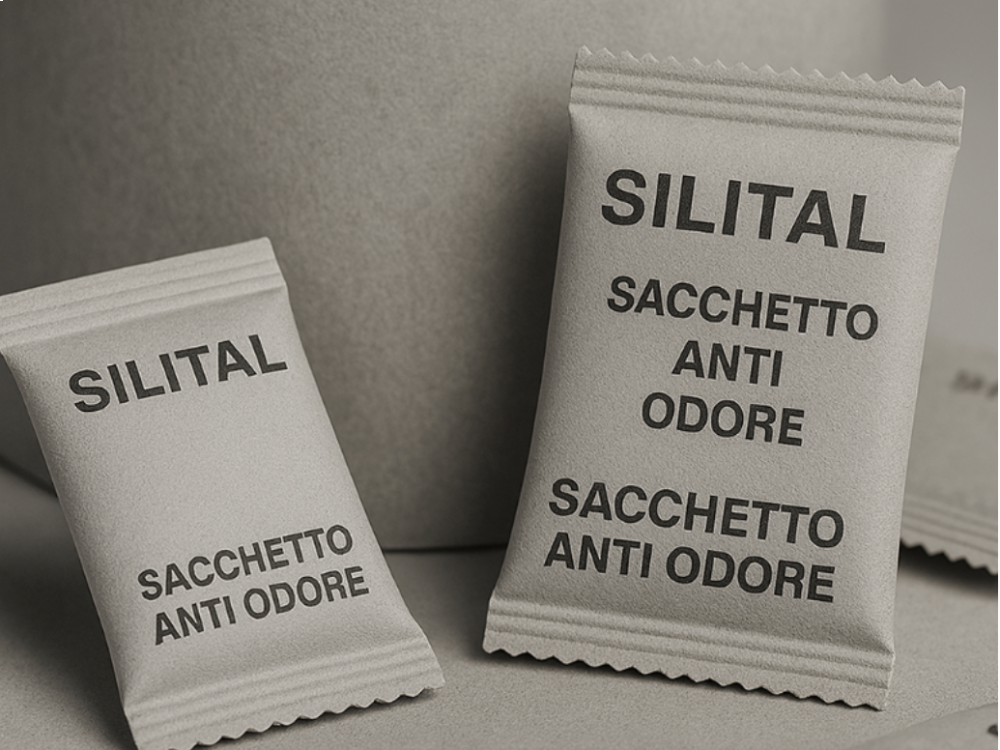
17-11-2025
Desiccant bags: the most effective raw materials to combat humidity
Discover the most effective raw materials in desiccant bags for humidity. Silica gel, clay, salts, a

Humidity is one of the most insidious agents for product preservation during transport and storage. Molds, corrosion, oxidation, and deterioration can compromise the quality of the goods and cause significant economic damage. Desiccant bags are the most widespread, effective, and versatile solution to prevent these risks.
But what makes them so performing? The answer is simple: the quality of the adsorbent raw materials used inside them. Each material has different chemical-physical characteristics and is selected based on the type of application, the degree of humidity to be absorbed, and the duration of the necessary protection.
How desiccant bags work
Desiccant bags contain adsorbent substances that capture and retain water vapor present in the environment. They do not transform it into liquid, but absorb it within their molecular structure. These materials are contained in breathable sachets, made with paper, Tyvek, or technical fabrics, which allow the passage of humidity without dispersing the absorbent particles.
Thanks to the variety of available raw materials, Silital is able to provide solutions suitable for every packaging, logistics, or storage need.
The main raw materials used
Silica gel
It is the most known and used desiccant material. Silica gel is an inert, non-toxic, and non-corrosive compound. It has a microporous structure that allows it to absorb up to 40% of its own weight in humidity.
- White silica gel: ideal for standard applications
- Orange silica gel: contains an indicator that changes color when the material is saturated
Silica gel is perfect for electronics, fashion, food, pharmaceutical, and high-sensitivity products.
Activated clay
Clay is a natural and economical solution. This material is obtained from selected minerals, processed to increase their absorption capacity.
- Excellent for environments with moderate humidity
- Guarantees gradual and prolonged action
- Eco-compatible and easily disposable
Desiccant bags with clay are widely used in the logistics, automotive, and industrial sectors.
Molecular sieves
Molecular sieves are synthetic materials with a very fine crystalline structure, capable of capturing even small water molecules.
- Very rapid action
- Excellent for environments with low relative humidity (<10%)
- Ideal for precision applications (electronics, optics, vacuum)
Their high selectivity makes them perfect for high-barrier packaging.
Mineral salts and calcium chloride
Some desiccant salts, such as calcium chloride, are used when it is necessary to absorb large quantities of humidity in critical environments, such as containers or high RH environments.
- Very high absorption capacity
- Release liquid (a collection container or combined absorbent material is necessary)
- Ideal for maritime transport and intermodal containers
Silital also offers combined systems with barrier and salts, for maximum efficiency.
Activated carbons
Although not strictly desiccants, activated carbon bags are often used in combination with desiccants. In addition to retaining vapor, they are effective against odors, gases, and volatile organic compounds (VOCs).
- Useful for closed environments or products sensitive to odors
- Also used in the pharmaceutical and funeral sectors
- Can be combined with silica gel or clay
How to choose the right material
The choice of raw material depends on various factors:
- Level of humidity to manage
- Expected duration of protection
- Type of product to be stored
- Transport or storage conditions
- Safety or food contact regulations
Silital supports its customers in selecting the most effective desiccant solution, offering tailor-made products, complete technical data sheets, and a dedicated consultancy service.
Desiccant bags are not all the same: choosing the right raw material is fundamental to ensuring effective and lasting protection against humidity. From silica gel to molecular sieves, from natural clays to high-capacity salts, Silital offers a wide range of technical solutions suitable for every industrial need.
Reliable protection always starts with the raw material, and the expertise of those who know how to choose it.



